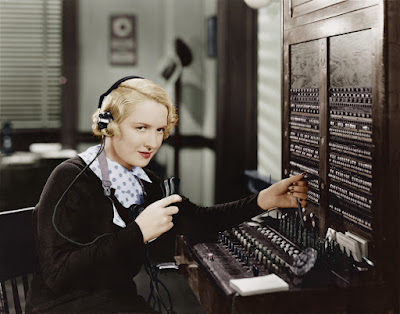 |
| Switchboard Operators 1915 -- History Channel |
Following the invention and then widespread use of telephones, one thing became quickly apparent—folks wanted to talk to more than one person on their newfangled invention. At the beginning, the telephone was much like the tin can-and-string contraption—two units connected by a single wire. You could call the person at the end of your wire, or they could call you.
In just about a year, The Holmes Burglar Alarm Company in Boston, Massachusetts, came up with the first central office and switchboard, serving as both a security office at night for banks and other businesses, as well as a telephone system.
The switchboard consisted of a desk-like piece of furniture where an operator set, plugging and unplugging calls and callers through a series of connections. At first, young men were hired, the thought being that since they worked well as telegraph operators. However, easily bored and sometimes with coarse language, they tended to get into trouble during slow times, sometimes ending up wrestling or causing a disturbance, other times wandering away from their station completely, leaving calls unanswered and unconnected. Thus, on September 1st, 1878, the Boston Telephone Dispatch hired Emma Nutt as the first woman operator.
Early switchboards in larger cities often spanned floor to ceiling to allow operators to reach all the lines in the exchanges. However, by the 1890s, divided switchboards were developed so teams served customers, working only the plugs in their section. Customers often knew their operator’s name, depending on what time they placed a call. At first, callers could ask for their party by name, but as populations with telephones increased, eventually the system assigned a unique number for each customer, which became known as their telephone number.
Eventually, callers would figure out they could call long distance, and so long-distance operators were employed to take the information of who was being called, would then make that call, then call back to connect the parties.
If you want to know more about how a switchboard actually operates, check out the article listed below from Wikipedia entitled “Telephone Switchboard”.
Switchboard operators were trained not only in the physical connection of calls, but also in switchboard etiquette. For example, there were rigid rules of dress. In the early days of the telephone, many parents were reluctant to give permission for their daughters to work at a telephone exchange, so the highest values of decorum, dress, and language were insisted upon. In particular, an operator could not be married, must be of high moral character, and no matter what the customer said, could only reply, “Thank you.” Long black dresses were the uniform, sometimes with a white blouse, and no jewelry visible. My character Juliette gets around this by wearing the string of pearls her late husband gave her on their wedding day underneath her shirtwaist, out of sight.
One note worth mentioning is that during the First World War, more than 200 female telephone operators facilitated communication between American, British, and French troops on the Western front, serving as operators and often also as translators. President Woodrow Wilson was so impressed that he changed his mind and dropped his objection to women’s suffrage in 1918, citing that partnering with women in war seemed to lead automatically to including them in voting rights.
With the coming of technology, however, telephone operators positions have decreased. By 1930, 235,000 operators worked in the US;, by 1940, less than 200,000. In 2021, only 5,000 workers were classified as telephone operators, with the number decreasing each year.
Giveaway: answer the following question to be entered into a random drawing for Juliette, Book 6 of the Switchboard Sisterhood. Please cleverly disguise your email address so the ‘bots don’t get you!
What is your funniest memory of using a telephone operator?
About Juliette:
A widow with her future planned out—and it doesn’t include marrying again. A physically scarred man resigned to remaining single. Can God work through a missing cat to bring them together?
Releases January 31st, but ebook is available for preorder here: https://www.amazon.com/dp/B0BJ66NX1Q
And you can check out the rest of the Series: https://www.amazon.com/dp/B0BNPJF8SJ
About Donna:
A hybrid author, Donna writes squeaky clean historical and contemporary suspense. She has been published more than 60 times in books; is a member of
several writers groups; facilitates a critique group; teaches writing classes; ghostwrites; edits; and judges in writing contests. She loves history and research, traveling extensively for both, and is an avid oil painter.
www.DonnaSchlachter.com Stay connected so you learn about new releases, preorders, and presales, as well as check out featured authors, book reviews, and a little corner of peace. Plus: Receive 2 free ebooks simply for signing up for our free newsletter!
Resources:
https://www.history.com/news/rise-fall-telephone-switchboard-operators
https://en.wikipedia.org/wiki/Telephone_switchboard
https://www.pbs.org/wgbh/americanexperience/features/telephone-development/
https://www.pbs.org/wgbh/americanexperience/films/telephone/
















